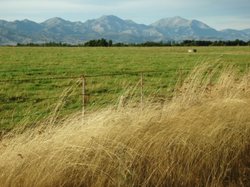
'New Zealand farmland prices have been falling in spite of record export dairy and other commodity prices.'
Global commodity boom driving farmland bids
VIEWPOINT
by TERRY HALL
Sir Michael Fay, his mainly Maori colleagues, and the rival Chinese bidders for the Crafar dairy farms, have one thing in common. In a world where global investors are all looking for safe havens for their money, they see New Zealand farmland as good buying.
Sir Michael knows how to make a buck as a key figure in the wheeler-dealing 20-odd years ago that saw a spate of state assets sold overseas including Telecom, NZ Rail and the Bank of New Zealand.
He continues to show this knack in putting together a consortium that is making a noisy patriotic bid for the farms. Being a skilled negotiator he is working hard to get them at a sizeable discount to the price offered by his Chinese rivals. Their bid hinges on a determination by the Overseas Investment Office.
I doubt that Fay had a blinding apocalyptic revelation about the future of farming, and the need to keep it in Kiwi ownership, when he returned to live here after years as a tax exile in Switzerland.
In seeking land, he is following the lead set by other moneyed international investors. Since the global financial crisis three years ago the catch-cry for wealthy people is to find safe places for their money. Many influential financial commentators, including ABN-AMRO in Britain, have been advising them to buy property, especially agricultural land, as over time it has been shown to hold its own against inflation which is expected to surge later this decade. In Britain agricultural land prices have hit record levels, encouraged by rising global food prices.
The Guardian reports main buyers are "agribusiness investors, cash-rich investors and domestic farmers." In May arable farm land in East Anglia was fetching [PndStlg]8500 an acre up from [PndStlg]3000 in 2005 due to record wheat prices. Savills, the land agents, forecast prices could rise to [PndStlg]10,000 an acre. Land used for livestock was not benefiting as much, due to widespread drought and higher farm costs.
Bloomberg reports that international investors, including billionaire George Soros and the Harvard University Endowment Fund are investing heavily in farmland in the US, parts of Europe, Latin America, Africa, and Australia. There has been offshore interest in New Zealand farms, including vineyards, kiwifruit and avocado orchards.
In the US, concern was expressed at the possibility of a bubble after the Federal Reserve Bank reported a 20 per cent rise in prices in the past 12 months in Kansas, Colorado, Nebraska and neighbouring states. Bloomberg said that while there has been extreme volatility in commodity prices over the past 30 years, the average value of a hectare of farmland, tracked by the US Department of Agriculture, has mostly risen steadily from US$1813 in 1980 to US$5781 at present.
Remarkably - and this would have sparked Fay's interest - New Zealand farmland prices have been falling in spite of record export dairy and other commodity prices. While these have cooled lately, few economists are expecting prices to plummet. Rabobank, in a report to a Washington conference a few days ago, predicted agricultural prices would shift higher and become more volatile, saying that any rolling back of biofuels legislation could add to the stresses. It said this would pose increasing problems for governments with their populations forced to cope with higher prices. Official figures, due to be announced soon will show the global population has soared to 9 billion, and climate change could add to food production problems in many countries.
Latest Real Estate Institute figures for the three months to July 31 show prices had fallen to levels last seen eight years ago, in September 2003. The median price per hectare for all farms was $14,649 in the July quarter down from $17,901 in the same period of last year.
From 2003 prices rose steadily, as farmers borrowed freely from banks and bought neighbouring properties at high prices. However since the global financial crisis in 2008 values have eased with farmers finding it harder to borrow and turning their attention to reducing debt. The recent volatility and strength of the Kiwi dollar, has added an extra note of caution in spite of a rising commodity prices.
Prices of farms in the Waikato are among those hit. State-owned Transpower has been forced to write off $50m over the past two years because of a fall in the value of farms it had to buy for power lines in 2006, the peak of the dairy land boom.
The Real Estate Institute reported a rise in the number of farms sold in the latest quarter, and a "solid inquiry" from buyers. This might reflect farmers becoming more realistic in their pricing.
Unfortunately it is difficult for Kiwi investors, who don't want to get their hands dirty or work hard and who lack Fay's money, to get an exposure to the sector. There is only one listed farm company, Rural Equities, on the Unlisted Market. It trades rarely. In its latest report, chairman Sir Selwyn Cushing said the value of its rural property portfolio remained stable, but was "starting to show signs of recovery". REL made a tax paid profit of $2.9m in the year to June 30, up from a loss of $3m the previous year.
- The Dominion Post











